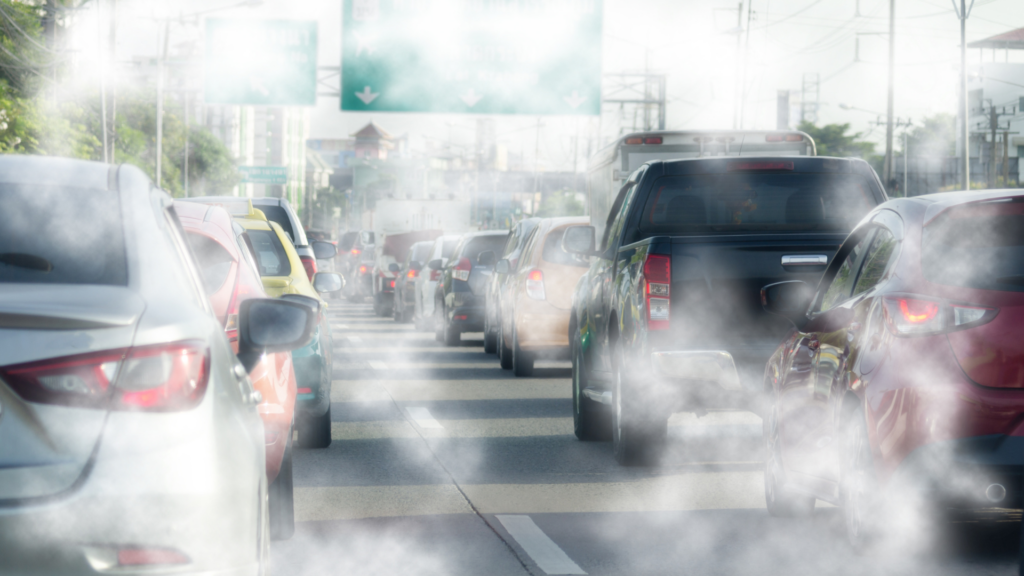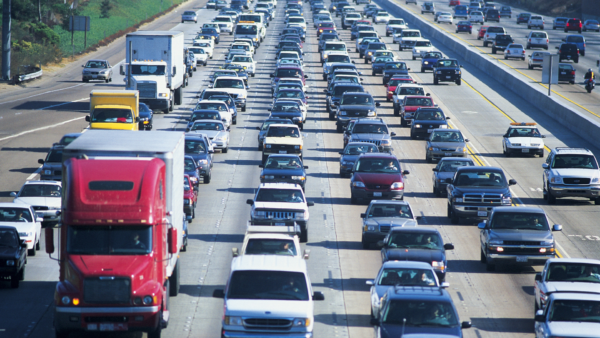Local solutions for the global climate crisis

Cars on highway with smog
We are now living through the hottest summer on record by a significant margin. While summers have been trending hotter since the 1940s, global average temperatures for the past few months have easily surpassed those of summer 2019, the previous record.
The toll of sweltering temperatures is staggering. Heat-related deaths have climbed, wildfires and other extreme weather events have raged, and intense heat waves are threatening food security.
There is a direct correlation between the concentrations of human-caused emissions of greenhouse gasses in the atmosphere and the extraordinary heat. In other words, our insistence on burning fossil fuels plays a significant, undeniable role in the devastating consequences of our warming planet.
Though this is a global crisis of epic proportions, there are things you can do here and now to help.
Drive less
Of the many actions you can take, one of the most impactful is driving less. Why? Because the emissions from our cars and trucks are the largest source of climate pollution in Charlotte, the state, and the nation.
In just the past 20 years, the average annual vehicle miles traveled in North Carolina has increased by almost 30 billion miles, according to a state Department of Transportation study. The transportation sector is now the largest source of greenhouse gas emissions in Charlotte, accounting for 40% of our total emissions in 2019, according to the city’s Strategic Energy Action Plan. That’s well over the national average for transportation, which clocks in at 27%. In fact, North Carolina ranks ninth highest in the U.S. for total transportation emissions, according to the state Department of Environmental Quality.
Driving so much takes a heavy toll on our environment. Climate change is already being felt in Charlotte, and its impacts will disproportionately affect people with low incomes and existing health conditions. If we don’t slow our greenhouse gas emissions, we can expect sea level rise on the coast, more days with dangerous heat, and more extreme weather events. Severe storms will cause flash flooding and damage to urban areas, and intense droughts will increase the risk of wildfires and agricultural loss.
In 2022, Charlotte City Council passed the Strategic Mobility Plan, a framework designed to improve Charlotte’s public transportation infrastructure to meet the needs of our growing population, make our city more walkable, and broaden our network of bicycle lanes. Importantly, the Strategic Mobility Plan sets an ambitious goal of reducing the share of people driving to work alone from 76% to 50% by 2040. This will help Charlotte reach its goal of becoming a low-carbon city by 2050 – but the goal won’t achieve itself!
We know a car-free lifestyle isn’t a feasible reality for everyone. However, you may be able to reduce some of your car trips and therefore reduce your carbon footprint. For example, you can:
- Get familiar with your nearest greenways, trails, and bike paths
- Find what bus routes make the most sense for you
- Choose to walk, bike, or take the bus to the grocery store or other nearby errands
- Batch your errands into one car ride, instead of making several trips
- Plan events closer to home
- Explore ridesharing or carpooling to events when possible
- Download and explore the Charlotte Area Transit System (CATS) app for more options
Use your voice
In addition to choosing to drive less, you can help Charlotte become a city that’s less dependent on cars and is safer for pedestrians, cyclists, and transit riders. Use your voice to advocate for protected bike lanes, better-connected sidewalks, and expansions to CATS’ bus and rail services by calling or emailing your city and county leaders. These investments will be crucial to building a more sustainable and less car-dependent city. If you aren’t sure who represents you, find that information here. We also share opportunities to use your voice throughout the year.
Plan your route
Use this list of resources to plan a car-free commute!
Connect with your neighborhood
Neighborhood associations connect neighbors and local business owners to preserve and improve their communities, allowing you to weigh in on areas such as neighborhood safety, beautification (like planting trees!), and even walkability and transportation needs in your neighborhood.
- Find your neighborhood association here.
- Consider downloading the Nextdoor app.
- Say “yes” to new neighbors in your area! Learn about why diverse housing options build resilient communities.
Thanks for taking climate action!
Thanks for reading!
As a nonprofit, community support is essential for us to keep doing what we do — including providing free articles like this. If you found this article helpful, please consider supporting Sustain Charlotte.
Want to stay in the loop? Subscribe to our weekly newsletter and follow us on Instagram, Facebook, and Twitter.

